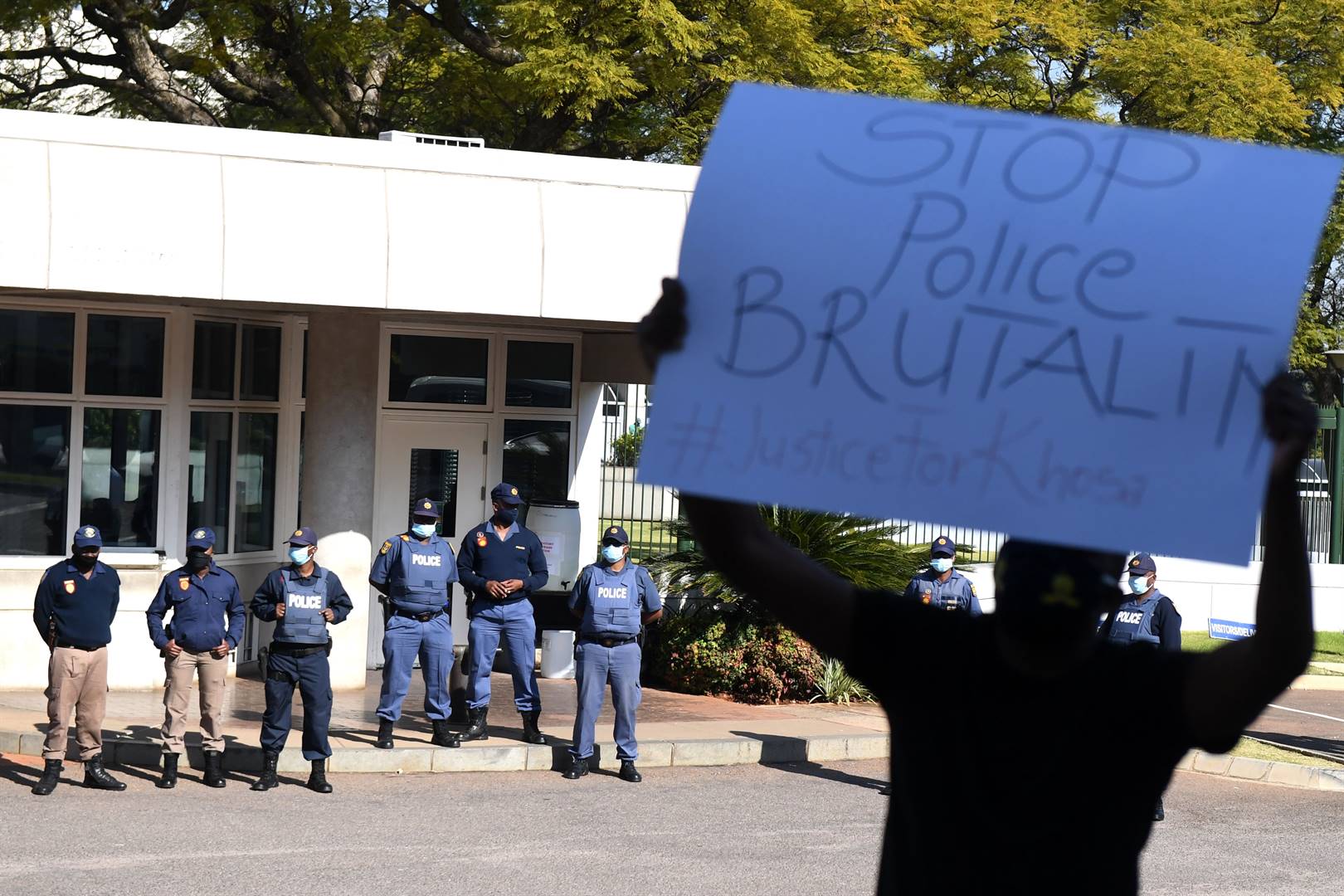


‘n Klein groepie mense van die #NotInMyName-stigting het Vrydag voor die Amerikaanse ambassade in Pretoria plakkate rondgeswaai om teen die dood van George Floyd van Amerika en Collins Khosa van Suid-Afrika te betoog.Foto: Deaan Vivier
Both George Floyd and Collins Khosa came into confrontation with policing systems that presumed criminality because of race, writes Ralph Mathekga.
It is often agreed that race is one of the most divisive issues in politics or in society in general. For thousands of years, the history of subjugation has pointed to race as one of the dominant proxies for unfair treatment and domination. The impact of race on access to opportunities across our societies is at times in your face where racial injustice is not sophisticated. Further, what also irritates most is the open ranting where racist people feel free to share their thoughts about those they consider to be racially inferior.
There are however instances where racial injustice is normalised in the legitimate institutions of power in societies; whereby racism is carried through institutions without racism being attached to the FACE of a racist person. In such cases of normalised racism, it is carried through legitimate institutions of power as they carry out their normal function in society. The killing of Collins Khosa is a clear indication of how racism can be normalised in these legitimate institutions of power. For some, the Khosa issue has nothing to do with race but sheer barbarism. For some, chances are that if Khosa was not black he might have ended up being arrested, possibly landing up with a criminal record he could fight against if alive. Alas, the departed cannot clear their name, let alone fight for anything. The matter illustrates how racism does not always need a racist’s face, if carried through institutions.
Some might think I’m avoiding the question as to whether black people can be racist, or whether women abuse men. Indeed, there is no one who is genetically wired to be racist or sexist, those are products of socialisation including competition for resources. So women can be sexist and black people can be racist. However, it is something else when this point is raised to avoid the reality that our society and institutions are structured and largely oriented in a way that unfairly discriminate against blacks, women and people with disabilities.
Here in South Africa, within some of our security institutions, we have normalised the way in which police used to treat the majority of black people in the past—often policing them in a harsh way—without looking into some of the fundamental presumptions we carried through. The lockdown in South Africa raised the difficult questions regarding how our security forces often get irritated when having to police the poor, the majority of whom happen to be black people who suffered similar treatment in the past.
A number of black people who were allegedly caught violating lockdown regulations were subjected to quick humiliating physical punishment while majority of people who were white were generally processed into the criminal justice system with charges pressed against them. On face value, a few push ups make the problem go away, rather than having to pay an admission of guilt fine and ending up with a criminal record. However, the presumptions behind who gets what punishment is troubling and never gets articulated publicly. It’s like social norm.
While the court compelled the police and the army to desist from physical punishment during the lockdown, one wonders what is the basis of the decision that some will face due process while others will be quickly processed by being subjected to corporal punishment. It is more concerning when a particular race group is consistently subjected to physical punishment. This is not supposed to be a difficult question in South Africa. It has been stated before by experts that the method of policing followed by SAPS is not really fit for a democratic society based on the culture of human rights. Yet police bosses often equate a heavy hand with being resolute. Criminals have to be hit hard! What if there is a bias in the way the institutions presume criminality? The results can be catastrophic, as happened to George Floyd and Collins Khosa.
The situation with Floyd and Khosa’s deaths is that they both came into confrontation with policing systems that presumed criminality of the two because of race. The only difference between the two cases divided by the Atlantic Ocean is that the government in South African cannot be racist because it is made up of black people.
Indeed, institutions are made up of black people, yet that does not mean they are deracialised in their orientation and function. Without getting exhausted with the crazy instances of racists rantings that have dominated the discourse on racism in South Africa, we should focus on how racism has been normalised in our institutions of power, particularly in the security sector.
– Dr Ralph Mathekga is a political analyst and author of When Zuma Goes and Ramaphosa’s Turn.

